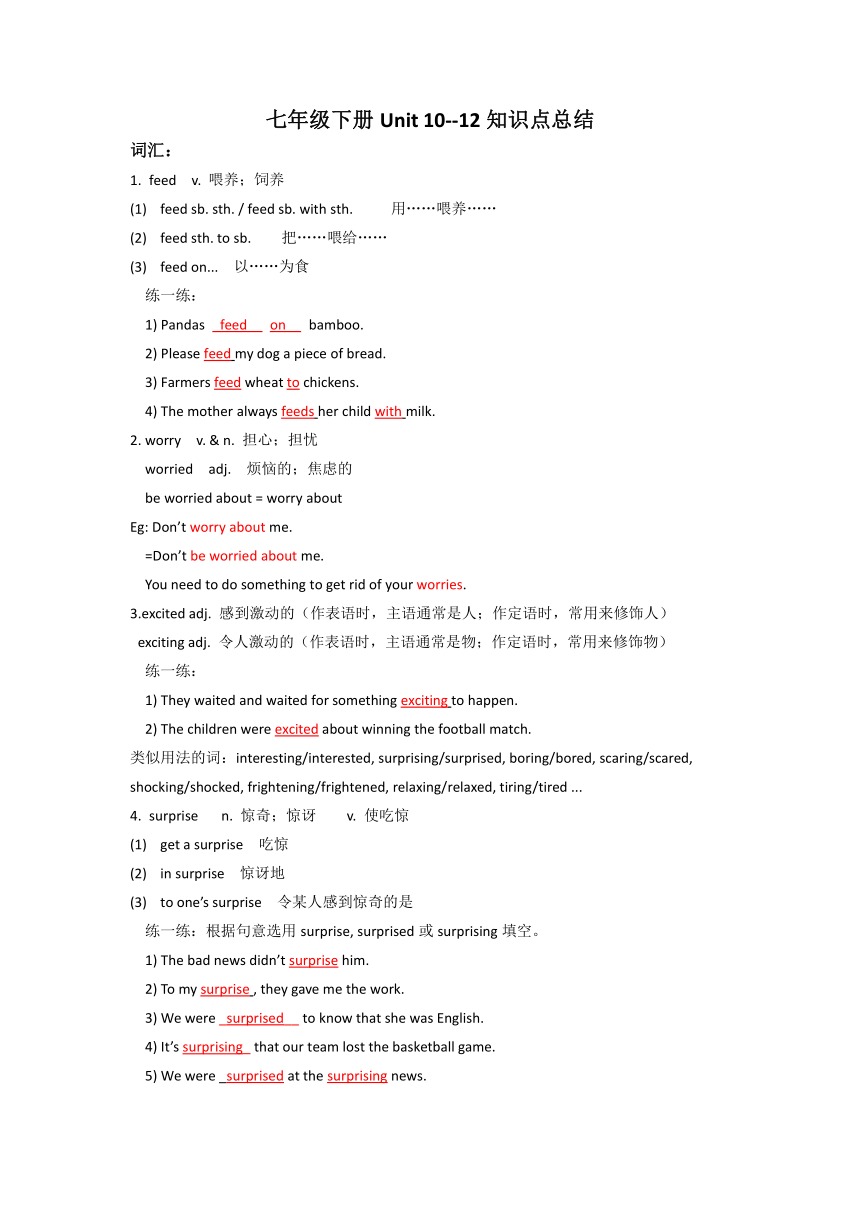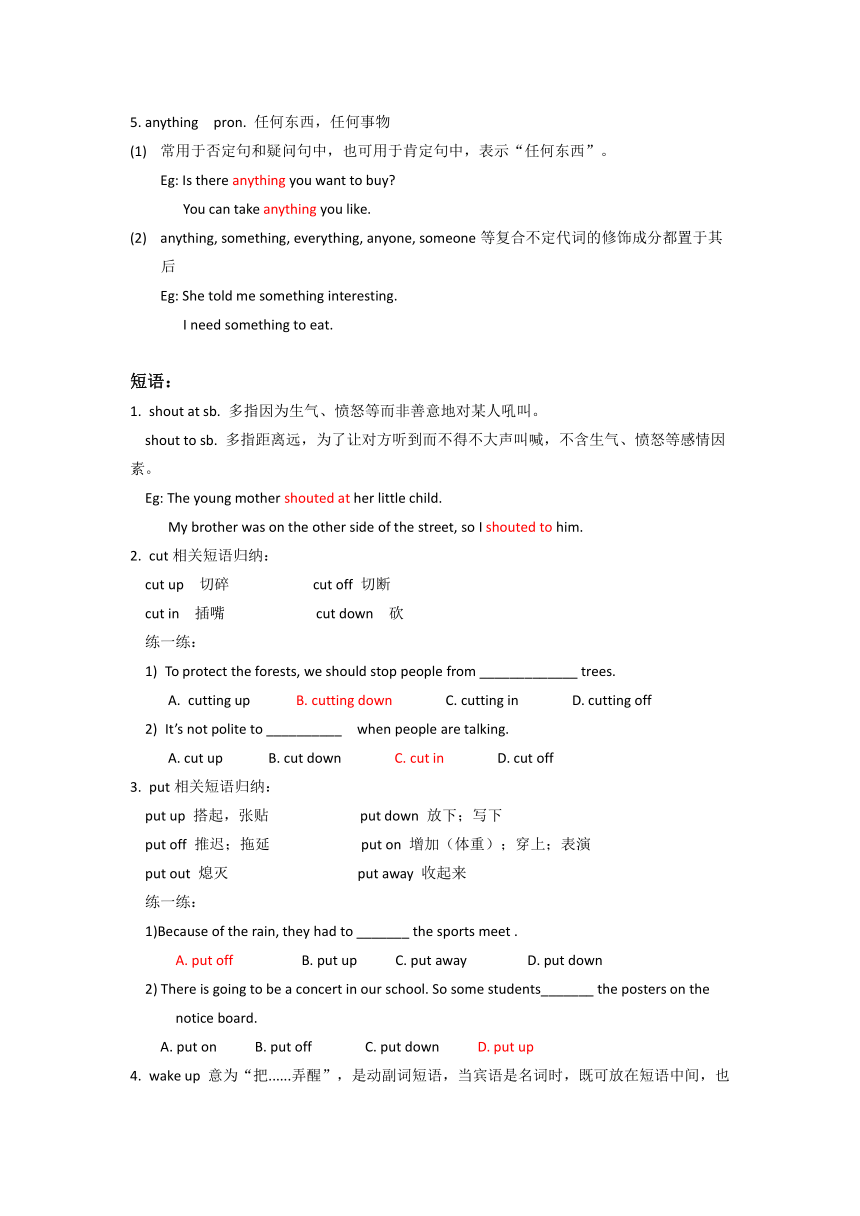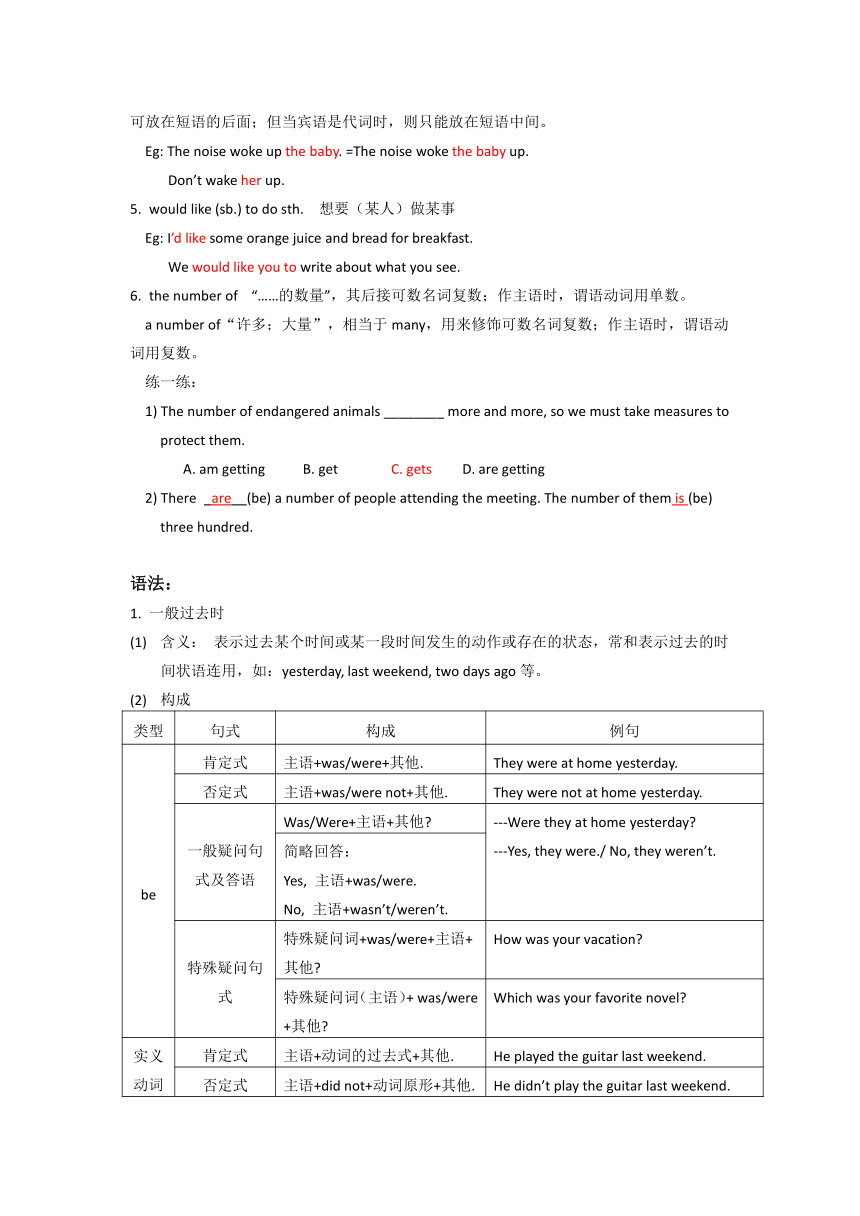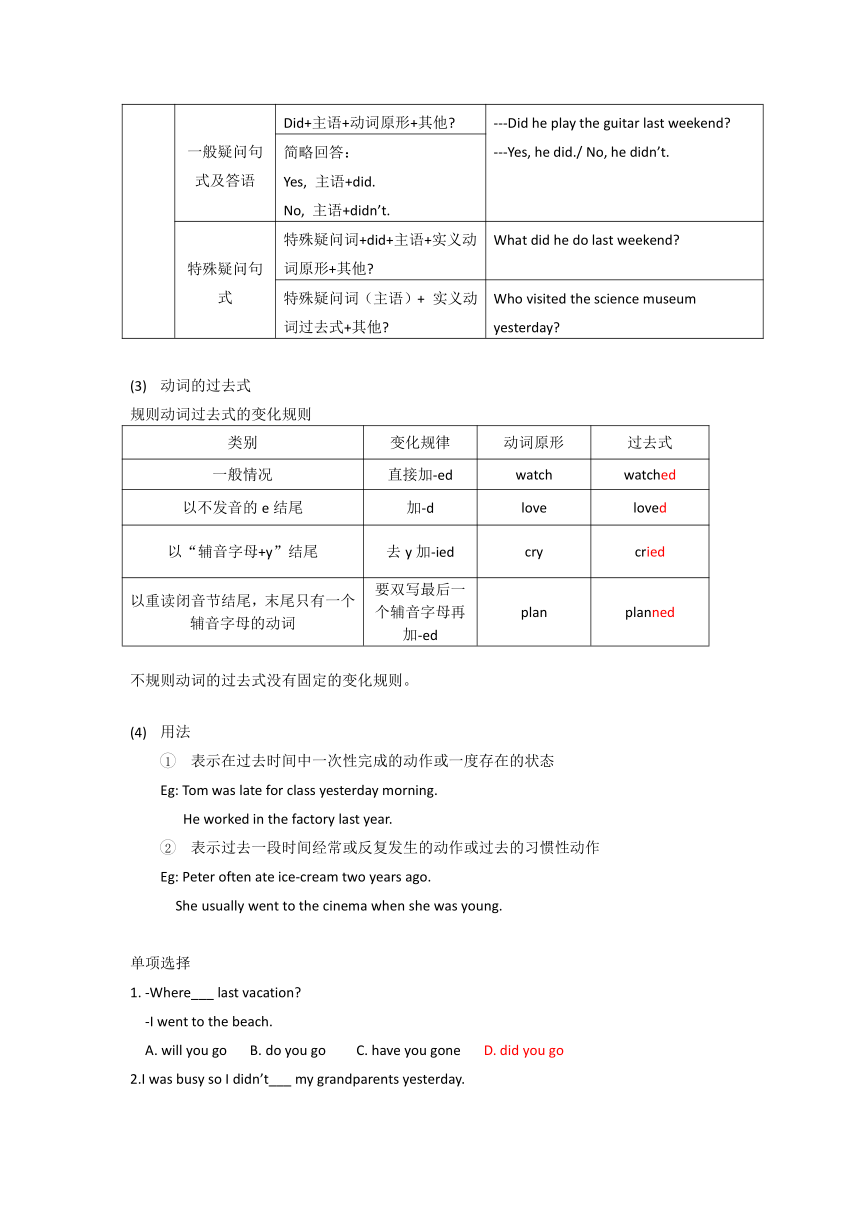七年级下册Units 10-12 知识点总结 2024年九年级中考人教版英语一轮复习
文档属性
| 名称 | 七年级下册Units 10-12 知识点总结 2024年九年级中考人教版英语一轮复习 |  | |
| 格式 | docx | ||
| 文件大小 | 26.2KB | ||
| 资源类型 | 教案 | ||
| 版本资源 | 通用版 | ||
| 科目 | 英语 | ||
| 更新时间 | 2023-11-27 09:58:00 | ||
图片预览




文档简介
七年级下册Unit 10--12知识点总结
词汇:
feed v. 喂养;饲养
feed sb. sth. / feed sb. with sth. 用……喂养……
feed sth. to sb. 把……喂给……
feed on... 以……为食
练一练:
1) Pandas feed on bamboo.
2) Please feed my dog a piece of bread.
3) Farmers feed wheat to chickens.
4) The mother always feeds her child with milk.
2. worry v. & n. 担心;担忧
worried adj. 烦恼的;焦虑的
be worried about = worry about
Eg: Don’t worry about me.
=Don’t be worried about me.
You need to do something to get rid of your worries.
3.excited adj. 感到激动的(作表语时,主语通常是人;作定语时,常用来修饰人)
exciting adj. 令人激动的(作表语时,主语通常是物;作定语时,常用来修饰物)
练一练:
1) They waited and waited for something exciting to happen.
2) The children were excited about winning the football match.
类似用法的词:interesting/interested, surprising/surprised, boring/bored, scaring/scared, shocking/shocked, frightening/frightened, relaxing/relaxed, tiring/tired ...
surprise n. 惊奇;惊讶 v. 使吃惊
get a surprise 吃惊
in surprise 惊讶地
to one’s surprise 令某人感到惊奇的是
练一练:根据句意选用surprise, surprised或surprising填空。
1) The bad news didn’t surprise him.
2) To my surprise , they gave me the work.
3) We were _surprised__ to know that she was English.
4) It’s surprising_ that our team lost the basketball game.
5) We were _surprised at the surprising news.
5. anything pron. 任何东西,任何事物
常用于否定句和疑问句中,也可用于肯定句中,表示“任何东西”。
Eg: Is there anything you want to buy
You can take anything you like.
anything, something, everything, anyone, someone等复合不定代词的修饰成分都置于其后
Eg: She told me something interesting.
I need something to eat.
短语:
shout at sb. 多指因为生气、愤怒等而非善意地对某人吼叫。
shout to sb. 多指距离远,为了让对方听到而不得不大声叫喊,不含生气、愤怒等感情因素。
Eg: The young mother shouted at her little child.
My brother was on the other side of the street, so I shouted to him.
cut相关短语归纳:
cut up 切碎 cut off 切断
cut in 插嘴 cut down 砍
练一练:
To protect the forests, we should stop people from _____________ trees.
cutting up B. cutting down C. cutting in D. cutting off
It’s not polite to __________ when people are talking.
A. cut up B. cut down C. cut in D. cut off
put相关短语归纳:
put up 搭起,张贴 put down 放下;写下
put off 推迟;拖延 put on 增加(体重);穿上;表演
put out 熄灭 put away 收起来
练一练:
1)Because of the rain, they had to _______ the sports meet .
A. put off B. put up C. put away D. put down
2) There is going to be a concert in our school. So some students_______ the posters on the notice board.
A. put on B. put off C. put down D. put up
wake up 意为“把......弄醒”,是动副词短语,当宾语是名词时,既可放在短语中间,也 可放在短语的后面;但当宾语是代词时,则只能放在短语中间。
Eg: The noise woke up the baby. =The noise woke the baby up.
Don’t wake her up.
would like (sb.) to do sth. 想要(某人)做某事
Eg: I’d like some orange juice and bread for breakfast.
We would like you to write about what you see.
the number of “……的数量”,其后接可数名词复数;作主语时,谓语动词用单数。
a number of “许多;大量”,相当于many,用来修饰可数名词复数;作主语时,谓语动词用复数。
练一练:
1) The number of endangered animals ________ more and more, so we must take measures to protect them.
A. am getting B. get C. gets D. are getting
2) There are (be) a number of people attending the meeting. The number of them is (be) three hundred.
语法:
一般过去时
含义: 表示过去某个时间或某一段时间发生的动作或存在的状态,常和表示过去的时间状语连用,如:yesterday, last weekend, two days ago等。
构成
类型 句式 构成 例句
be 肯定式 主语+was/were+其他. They were at home yesterday.
否定式 主语+was/were not+其他. They were not at home yesterday.
一般疑问句式及答语 Was/Were+主语+其他 ---Were they at home yesterday ---Yes, they were./ No, they weren’t.
简略回答: Yes, 主语+was/were. No, 主语+wasn’t/weren’t.
特殊疑问句式 特殊疑问词+was/were+主语+其他 How was your vacation
特殊疑问词(主语)+ was/were +其他 Which was your favorite novel
实义动词 肯定式 主语+动词的过去式+其他. He played the guitar last weekend.
否定式 主语+did not+动词原形+其他. He didn’t play the guitar last weekend.
一般疑问句式及答语 Did+主语+动词原形+其他 ---Did he play the guitar last weekend ---Yes, he did./ No, he didn’t.
简略回答: Yes, 主语+did. No, 主语+didn’t.
特殊疑问句式 特殊疑问词+did+主语+实义动词原形+其他 What did he do last weekend
特殊疑问词(主语)+ 实义动词过去式+其他 Who visited the science museum yesterday
动词的过去式
规则动词过去式的变化规则
类别 变化规律 动词原形 过去式
一般情况 直接加-ed watch watched
以不发音的e结尾 加-d love loved
以“辅音字母+y”结尾 去y加-ied cry cried
以重读闭音节结尾,末尾只有一个辅音字母的动词 要双写最后一个辅音字母再加-ed plan planned
不规则动词的过去式没有固定的变化规则。
用法
表示在过去时间中一次性完成的动作或一度存在的状态
Eg: Tom was late for class yesterday morning.
He worked in the factory last year.
表示过去一段时间经常或反复发生的动作或过去的习惯性动作
Eg: Peter often ate ice-cream two years ago.
She usually went to the cinema when she was young.
单项选择
1. -Where___ last vacation
-I went to the beach.
A. will you go B. do you go C. have you gone D. did you go
2.I was busy so I didn’t___ my grandparents yesterday.
A. visited B. visit C. are visiting D. visits
3. -___ nice the hat is!
-Thank you!
A.What a B. What C.How D. How a
4. Don't _____ too late, or you'll feel tired tomorrow.
A. grow up B. put up C. stay up D. look up
5.---I_____ that you _____ at school yesterday. What happened to you
---I was ill so I asked a day off.
A. heard; aren't B. am hearing; aren't C. heard; were D. heard; weren't
6. Climbing a mountain was ___, so we all felt ______ when we reached (到达) the top of the high mountain.
A. tiring; tired B. tired; tiring C. tiring; tiring D. tired; tired
7. I saw Lin Lin ______ football on my way home.
A. play B. playing C. to play D. played
8. Tina is _____ shy______ she never talks in front of the class.
A. such; that B. too; to C. so; that D. so; to
9. Mike is very tired,please don’t___
A. wake up he B. wake he up C. wake up him D. wake him up
可数名词和不可数名词
可数名词复数形式的变化规则
规则变化
类别 构成法 例词
一般情况 加-s (清辅音后读/s/,浊辅音和元音后读/z/,/s/、/z/、/d /等音后发/iz/) map-maps boy-boys girl-girls pen-pens
以s, sh, ch, x结尾 加-es,读/iz/ baby---babies city-cities country-countries
以辅音字母+y结尾 变y为i再加es,读/iz/ monkey---monkeys holiday---holidays
以字母o结尾 少数加-es,读/z/ hero-heroes tomato-tomatoes potato-potatoes
一般加-s,读/z/ piano-pianos photo-photos radio-radios
部分以f或fe结尾 一般把f或fe变ve加s leaf-leaves shelf-shelves wife-wives knife-knives life-lives(生命) half-halves
不规则变化
名词内部元音变化
例如: child---children foot---feet tooth---teeth mouse---mice
man---men woman---women
关于man, woman的词
例如:合成词:policeman-policemen businessman-businessmen
非合成词:human-humans German-Germans
复合词:woman doctor---women doctors
单复数同形
例如:sheep fish deer
国家专有名词
例如:不变化:Chinese Japanese Swiss
变化:German---Germans Englishman--- Englishmen Frenchman--- Frenchmen
有些名词只有复数形式,同时也表示复数含义;做主语时,谓语动词用复数。
例如:clothes trousers shorts glasses socks
Eg: There are two pairs of glasses on the table.
The socks that have been washed are not mine.
有些名词没有形式的变化,但表示复数意义;做主语时,谓语动词用复数。
例如:police people
Eg: Some people like watching talk shows.
不可数名词的数
不可数名词没有复数形式,当要表示确切的量时,可以借助量词,其结构为“量词+of+不可数名词”。当这一结构作主语时,谓语动词的单、复数要和量词保持一致;
Eg: There is a bottle of water on the table.
I’m very hungry. Three pieces of bread are not enough for me.
当表示不确切的数量时,可用some, a little, little, a lot of, lots of, plenty of等词来修饰。此结构做主语时,谓语动词用单数。
Eg: Many students have little spare time.
Lots of water has been wasted in this area.
既可作可数又可作不可数的名词
有些名词可数还是不可数是根据其意义来判断的,如:
当fish, salad, ice-cream等名词表示该类事物的种类时,则可数;只表示该类事物的数量时,则不可数。
Eg: three fishes 意为“3种鱼”
three fish 意为“3条鱼”
当chicken表示“鸡肉”时,是不可数名词;当表示“小鸡”时,是可数名词。
Eg: I’d like some chicken. 我想要些鸡肉。
I fed some chickens at the farm. 我在农场喂了鸡。
当cabbage表示一颗一颗的卷心菜时,是可数名词;当表示被切碎的菜,或煮熟的菜时,则不可数。
Eg: My mother bought two cabbages in the supermarket.
我的妈妈在超市买了2颗卷心菜。
There are some cabbage in the mutton noodles.
羊肉面里有一些卷心菜。
单项选择
1. -Are there any____in the picture
-Yes, there are.
A.fish B.mutton C.beef D. apple
2. -What would you like for breakfast -I'd like______
A. tomato noodle B. tomato noodles
C. tomatoes noodle D. tomatoes noodles
3.The film is__among young people.
A. meaningful B. traditional C. popular D. special
4.-May I take your_________
-Yes,I'd like some beef.
A. size B. age C. order D. number
5.-____noodles would you like
-Small, please.
A.What kind of B.What size bowl of C. How much D. How many
6.Helen is very thirsty and she wants two______
A.cup of teas B. cups of tea C.cups of tea D. cup of tea
7. The number of the players on the playground ___ 20.
A.am B. is C.are D. be
8. If it____rain tomorrow, we will go camping.
A. doesn't B. won't C. wouldn't D, isn't
9. Please______these vegetables and meat before making soup.
A.cut up B. cut out C. cut off D. cut in
10.I don’t like salad, apples _______ fish.
A.so B.also C.and D.or
词汇:
feed v. 喂养;饲养
feed sb. sth. / feed sb. with sth. 用……喂养……
feed sth. to sb. 把……喂给……
feed on... 以……为食
练一练:
1) Pandas feed on bamboo.
2) Please feed my dog a piece of bread.
3) Farmers feed wheat to chickens.
4) The mother always feeds her child with milk.
2. worry v. & n. 担心;担忧
worried adj. 烦恼的;焦虑的
be worried about = worry about
Eg: Don’t worry about me.
=Don’t be worried about me.
You need to do something to get rid of your worries.
3.excited adj. 感到激动的(作表语时,主语通常是人;作定语时,常用来修饰人)
exciting adj. 令人激动的(作表语时,主语通常是物;作定语时,常用来修饰物)
练一练:
1) They waited and waited for something exciting to happen.
2) The children were excited about winning the football match.
类似用法的词:interesting/interested, surprising/surprised, boring/bored, scaring/scared, shocking/shocked, frightening/frightened, relaxing/relaxed, tiring/tired ...
surprise n. 惊奇;惊讶 v. 使吃惊
get a surprise 吃惊
in surprise 惊讶地
to one’s surprise 令某人感到惊奇的是
练一练:根据句意选用surprise, surprised或surprising填空。
1) The bad news didn’t surprise him.
2) To my surprise , they gave me the work.
3) We were _surprised__ to know that she was English.
4) It’s surprising_ that our team lost the basketball game.
5) We were _surprised at the surprising news.
5. anything pron. 任何东西,任何事物
常用于否定句和疑问句中,也可用于肯定句中,表示“任何东西”。
Eg: Is there anything you want to buy
You can take anything you like.
anything, something, everything, anyone, someone等复合不定代词的修饰成分都置于其后
Eg: She told me something interesting.
I need something to eat.
短语:
shout at sb. 多指因为生气、愤怒等而非善意地对某人吼叫。
shout to sb. 多指距离远,为了让对方听到而不得不大声叫喊,不含生气、愤怒等感情因素。
Eg: The young mother shouted at her little child.
My brother was on the other side of the street, so I shouted to him.
cut相关短语归纳:
cut up 切碎 cut off 切断
cut in 插嘴 cut down 砍
练一练:
To protect the forests, we should stop people from _____________ trees.
cutting up B. cutting down C. cutting in D. cutting off
It’s not polite to __________ when people are talking.
A. cut up B. cut down C. cut in D. cut off
put相关短语归纳:
put up 搭起,张贴 put down 放下;写下
put off 推迟;拖延 put on 增加(体重);穿上;表演
put out 熄灭 put away 收起来
练一练:
1)Because of the rain, they had to _______ the sports meet .
A. put off B. put up C. put away D. put down
2) There is going to be a concert in our school. So some students_______ the posters on the notice board.
A. put on B. put off C. put down D. put up
wake up 意为“把......弄醒”,是动副词短语,当宾语是名词时,既可放在短语中间,也 可放在短语的后面;但当宾语是代词时,则只能放在短语中间。
Eg: The noise woke up the baby. =The noise woke the baby up.
Don’t wake her up.
would like (sb.) to do sth. 想要(某人)做某事
Eg: I’d like some orange juice and bread for breakfast.
We would like you to write about what you see.
the number of “……的数量”,其后接可数名词复数;作主语时,谓语动词用单数。
a number of “许多;大量”,相当于many,用来修饰可数名词复数;作主语时,谓语动词用复数。
练一练:
1) The number of endangered animals ________ more and more, so we must take measures to protect them.
A. am getting B. get C. gets D. are getting
2) There are (be) a number of people attending the meeting. The number of them is (be) three hundred.
语法:
一般过去时
含义: 表示过去某个时间或某一段时间发生的动作或存在的状态,常和表示过去的时间状语连用,如:yesterday, last weekend, two days ago等。
构成
类型 句式 构成 例句
be 肯定式 主语+was/were+其他. They were at home yesterday.
否定式 主语+was/were not+其他. They were not at home yesterday.
一般疑问句式及答语 Was/Were+主语+其他 ---Were they at home yesterday ---Yes, they were./ No, they weren’t.
简略回答: Yes, 主语+was/were. No, 主语+wasn’t/weren’t.
特殊疑问句式 特殊疑问词+was/were+主语+其他 How was your vacation
特殊疑问词(主语)+ was/were +其他 Which was your favorite novel
实义动词 肯定式 主语+动词的过去式+其他. He played the guitar last weekend.
否定式 主语+did not+动词原形+其他. He didn’t play the guitar last weekend.
一般疑问句式及答语 Did+主语+动词原形+其他 ---Did he play the guitar last weekend ---Yes, he did./ No, he didn’t.
简略回答: Yes, 主语+did. No, 主语+didn’t.
特殊疑问句式 特殊疑问词+did+主语+实义动词原形+其他 What did he do last weekend
特殊疑问词(主语)+ 实义动词过去式+其他 Who visited the science museum yesterday
动词的过去式
规则动词过去式的变化规则
类别 变化规律 动词原形 过去式
一般情况 直接加-ed watch watched
以不发音的e结尾 加-d love loved
以“辅音字母+y”结尾 去y加-ied cry cried
以重读闭音节结尾,末尾只有一个辅音字母的动词 要双写最后一个辅音字母再加-ed plan planned
不规则动词的过去式没有固定的变化规则。
用法
表示在过去时间中一次性完成的动作或一度存在的状态
Eg: Tom was late for class yesterday morning.
He worked in the factory last year.
表示过去一段时间经常或反复发生的动作或过去的习惯性动作
Eg: Peter often ate ice-cream two years ago.
She usually went to the cinema when she was young.
单项选择
1. -Where___ last vacation
-I went to the beach.
A. will you go B. do you go C. have you gone D. did you go
2.I was busy so I didn’t___ my grandparents yesterday.
A. visited B. visit C. are visiting D. visits
3. -___ nice the hat is!
-Thank you!
A.What a B. What C.How D. How a
4. Don't _____ too late, or you'll feel tired tomorrow.
A. grow up B. put up C. stay up D. look up
5.---I_____ that you _____ at school yesterday. What happened to you
---I was ill so I asked a day off.
A. heard; aren't B. am hearing; aren't C. heard; were D. heard; weren't
6. Climbing a mountain was ___, so we all felt ______ when we reached (到达) the top of the high mountain.
A. tiring; tired B. tired; tiring C. tiring; tiring D. tired; tired
7. I saw Lin Lin ______ football on my way home.
A. play B. playing C. to play D. played
8. Tina is _____ shy______ she never talks in front of the class.
A. such; that B. too; to C. so; that D. so; to
9. Mike is very tired,please don’t___
A. wake up he B. wake he up C. wake up him D. wake him up
可数名词和不可数名词
可数名词复数形式的变化规则
规则变化
类别 构成法 例词
一般情况 加-s (清辅音后读/s/,浊辅音和元音后读/z/,/s/、/z/、/d /等音后发/iz/) map-maps boy-boys girl-girls pen-pens
以s, sh, ch, x结尾 加-es,读/iz/ baby---babies city-cities country-countries
以辅音字母+y结尾 变y为i再加es,读/iz/ monkey---monkeys holiday---holidays
以字母o结尾 少数加-es,读/z/ hero-heroes tomato-tomatoes potato-potatoes
一般加-s,读/z/ piano-pianos photo-photos radio-radios
部分以f或fe结尾 一般把f或fe变ve加s leaf-leaves shelf-shelves wife-wives knife-knives life-lives(生命) half-halves
不规则变化
名词内部元音变化
例如: child---children foot---feet tooth---teeth mouse---mice
man---men woman---women
关于man, woman的词
例如:合成词:policeman-policemen businessman-businessmen
非合成词:human-humans German-Germans
复合词:woman doctor---women doctors
单复数同形
例如:sheep fish deer
国家专有名词
例如:不变化:Chinese Japanese Swiss
变化:German---Germans Englishman--- Englishmen Frenchman--- Frenchmen
有些名词只有复数形式,同时也表示复数含义;做主语时,谓语动词用复数。
例如:clothes trousers shorts glasses socks
Eg: There are two pairs of glasses on the table.
The socks that have been washed are not mine.
有些名词没有形式的变化,但表示复数意义;做主语时,谓语动词用复数。
例如:police people
Eg: Some people like watching talk shows.
不可数名词的数
不可数名词没有复数形式,当要表示确切的量时,可以借助量词,其结构为“量词+of+不可数名词”。当这一结构作主语时,谓语动词的单、复数要和量词保持一致;
Eg: There is a bottle of water on the table.
I’m very hungry. Three pieces of bread are not enough for me.
当表示不确切的数量时,可用some, a little, little, a lot of, lots of, plenty of等词来修饰。此结构做主语时,谓语动词用单数。
Eg: Many students have little spare time.
Lots of water has been wasted in this area.
既可作可数又可作不可数的名词
有些名词可数还是不可数是根据其意义来判断的,如:
当fish, salad, ice-cream等名词表示该类事物的种类时,则可数;只表示该类事物的数量时,则不可数。
Eg: three fishes 意为“3种鱼”
three fish 意为“3条鱼”
当chicken表示“鸡肉”时,是不可数名词;当表示“小鸡”时,是可数名词。
Eg: I’d like some chicken. 我想要些鸡肉。
I fed some chickens at the farm. 我在农场喂了鸡。
当cabbage表示一颗一颗的卷心菜时,是可数名词;当表示被切碎的菜,或煮熟的菜时,则不可数。
Eg: My mother bought two cabbages in the supermarket.
我的妈妈在超市买了2颗卷心菜。
There are some cabbage in the mutton noodles.
羊肉面里有一些卷心菜。
单项选择
1. -Are there any____in the picture
-Yes, there are.
A.fish B.mutton C.beef D. apple
2. -What would you like for breakfast -I'd like______
A. tomato noodle B. tomato noodles
C. tomatoes noodle D. tomatoes noodles
3.The film is__among young people.
A. meaningful B. traditional C. popular D. special
4.-May I take your_________
-Yes,I'd like some beef.
A. size B. age C. order D. number
5.-____noodles would you like
-Small, please.
A.What kind of B.What size bowl of C. How much D. How many
6.Helen is very thirsty and she wants two______
A.cup of teas B. cups of tea C.cups of tea D. cup of tea
7. The number of the players on the playground ___ 20.
A.am B. is C.are D. be
8. If it____rain tomorrow, we will go camping.
A. doesn't B. won't C. wouldn't D, isn't
9. Please______these vegetables and meat before making soup.
A.cut up B. cut out C. cut off D. cut in
10.I don’t like salad, apples _______ fish.
A.so B.also C.and D.or
